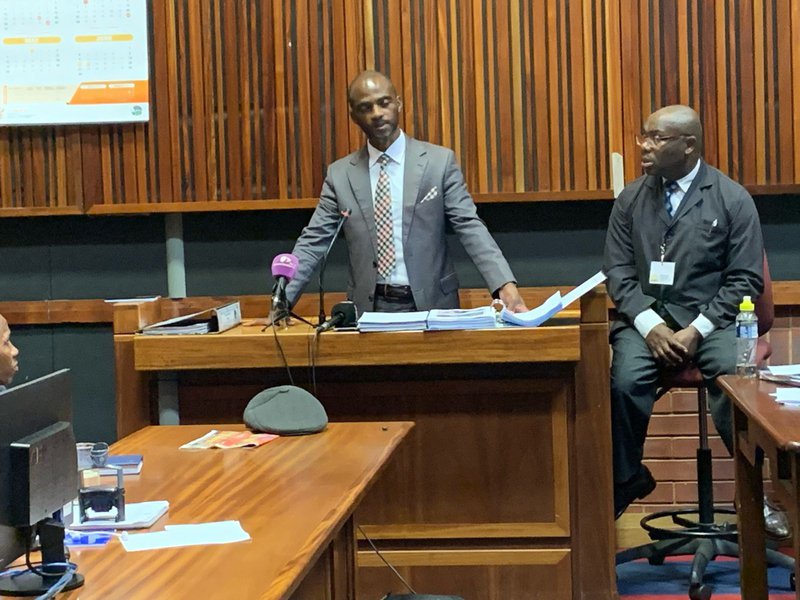Investigator tells court Mkhwanazi led victims to ‘slaughterhouse’
Updated | By Masechaba Sefularo
The investigating officer in the case of six slain Johannesburg sex workers gave chilling testimony on the police's theories on the murders.

*Please note the story contains details of sexual violence.
Sergeant Bongani Mbonambi took the stand as the state’s fourth witness in the trial of alleged serial killer Sifiso Mkhwanazi in the High Court sitting in Palm Ridge on Wednesday.
Mbonambi said DNA evidence found at the scene implied that at least three women were killed in one room.
“These are different bodies which were not found in this particular room but rather were concealed somewhere in the building. So, the conclusion that we came up with is that this room was used as a slaughterhouse.”
He said further investigations revealed blood stains, found on the stairway leading to the room, were consistent with drag marks; suggesting the bodies were dragged from the room to where they were hidden.
“You’ll remember the testimony of the caretaker that he came in one morning and the stairs were wet. When he wanted to thank the cleaner for cleaning the stairs, the cleaner said it was not them [who cleaned] but the accused.”
Mkhwanazi made admissions assuming responsibility for the murders. However, he denies the state’s claim that he raped the women and that the murders were premeditated.
But paging through the arch lever file with the photographs depicting the state in which the bodies were found, the policeman told the court investigators concluded the victims’ hands and legs were bound with rope to restrain them while they were raped multiple times.
“If you killed a person, why would you need to tie them up? We then thought that it was possible that these victims were not killed at once. You do that when you don’t want someone to run away or scream…The amount of condoms found on the scene makes logical sense to what we are saying.”
Mbonambi rejected the accused’s claim that the murders were a spontaneous reaction triggered by rage and the fear of being arrested for rape when he allegedly disagreed with the sex workers over payment for their services.
SEVEN COUNTS OF RAPE AND THE ALLEGED TRIGGER
The seven counts of rape Mkhwanazi has been charged with include the 2021 case that saw him spend 10 months in police custody.
Mkhwanazi claims he was falsely accused of rape by the sex worker, who later withdrew the case.
State Prosecutor Leswikane Mashabela asked the investigator why the complainant in that matter had not been called to testify.
“We tried to trace her but the phone she was using has changed, and the address that she was residing at had also changed,” Mbonambi responded.
He added that efforts to locate her through her colleagues on the streets proved futile because she used a pseudonym for her work.
Mbonambi said the accused’s claim of blind fury when faced by similar circumstances that led to his initial arrest does not hold.
“When he comes out of prison, one would expect that he was going to stay away from doing any business with sex workers. Instead, he went back to the streets, picked up sex workers, and went to his father’s factory.
“Even though he says the sex was consensual, he was still angry at the time. It happened that there was a disagreement after they had sex, then he had to kill because he couldn’t bear the thought of going back to prison and then concealed the body.”
He said if the court were to accept that the first murder was a "mistake", Mkhwanazi offers little explanation for how he repeated the same mistake five more times.
“His action is like going to a fishpond, pick the fish you want. He came back with the second sex worker and now he knows what the outcome was of the first one and the reason for killing her. A similar result comes from the second one, conceals the body in the same factory. He returns to the same fishpond, picks the one he likes, and goes back to the factory. This goes on until there are six bodies.”
WATCH:Sgt Mbonambi disputes #SifisoMkhwanazi’s claim that he left one of the bodies in a room where it could be found. This is an issue of contention as Mkhwanazi pleaded not guilty to a count of obstructing the administration of justice relating to the concealment of that body pic.twitter.com/opsvdd4NHX
— Jacaranda News (@JacaNews) February 14, 2024
Mbonambi also disputed Mkhwanazi’s claim that he left one of the bodies in a room where it could be found.
The accused pleaded not guilty to a count of obstructing the administration of justice relating to the concealment of that body.
Mbonambi said they believe Mkhwanazi had planned to move the body but the trolley bins that he had previously used to transfer the bodies, from the room where they had been murdered, where no longer available as he had stuffed the bodies of his other victims in them.
The defence is expected to cross-examine the officer when the trial resumes on Monday.
ALSO READ:

Show's Stories
-
Chinese mother kidnaps girl who is 'marriage material' for son
According to news sources this is connected to an ancient tradition in C...
The Workzone with Alex Jay 2 hours ago -
Grandfather loses baby in a pile of dried leaves
Would you panic in this situation?
The Workzone with Alex Jay 2 hours ago